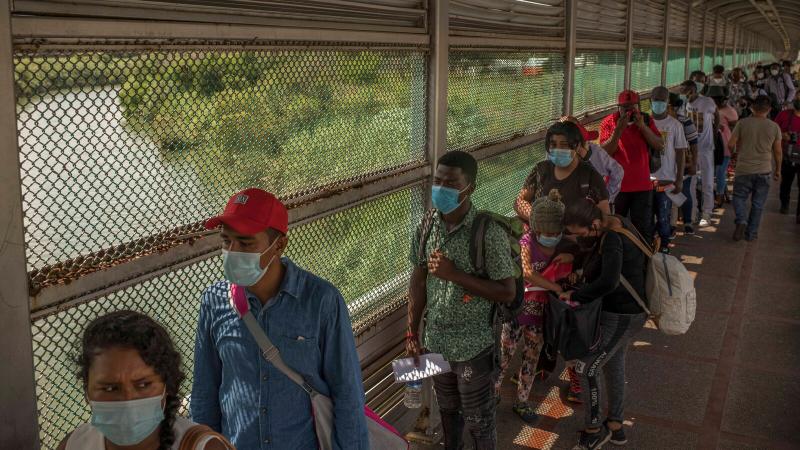As Migrants Surge Toward Border, Court Hands Biden a Lifeline
Category: News & Politics
Via: texan1211 • 3 years ago • 2 commentsBy: Natalie Kitroeff and Daniele Volpe (MSN)



© Provided by The New York Times Migrants, mostly from Central America and Haiti, waiting on the International Bridge last month in Matamoros, Mexico, to enter the United States to request asylum.
MATAMOROS, Mexico — When the Supreme Court effectively revived a cornerstone of Trump-era migration policy late last month, it looked like a major defeat for President Biden.
© Provided by The New York Times Border Patrol agents checking the documents of migrants trying to cross into Brownsville, Tex., from Matamoros, Mexico, to seek asylum.
After all, Mr. Biden had condemned the policy — which requires asylum seekers to wait in Mexico — as "inhumane" and suspended it on his first day in office, part of an aggressive push to dismantle former President Donald J. Trump's harshest migration policies.
But among some Biden officials, the Supreme Court's order was quietly greeted with something other than dismay, current and former officials said: It brought some measure of relief.
Before that ruling, Mr. Biden's steps to begin loosening the reins on migration had been quickly followed by a surge of people heading north, overwhelming the southwest border of the United States. Apprehensions of migrants hit a two-decade high in July, a trend officials fear will continue into the fall.
Concern had already been building inside the Biden administration that the speed of its immigration changes may have encouraged migrants to stream toward the United States, current and former officials said.
In fact, some Biden officials were already talking about reviving Mr. Trump's policy in a limited way to deter migration, said the officials, who have worked on immigration policy but were not authorized to speak publicly about the administration's internal debates on the issue. Then the Supreme Court order came, providing the Biden administration with the political cover to adopt the policy in some form without provoking as much ire from Democrats who reviled Mr. Trump's border policies.
Now, the officials say, they have an opportunity to take a step back, come up with a more humane version of Mr. Trump's policy and, they hope, reduce the enormous number of people arriving at the border.
"This desire to reverse Trump's policies and to do so quickly has landed the Biden administration in this predicament, which was not unpredictable and is very sad to watch," said Alan Bersin, who served as commissioner of U.S. Customs and Border Protection under President Barack Obama.
The policy at the center of the case — commonly known as Remain in Mexico — quickly became one of the most contentious elements of Mr. Trump's immigration agenda because it upended central provisions of the nation's asylum system. Instead of allowing migrants to enter the United States while the courts assessed their claims, it made thousands of asylum seekers wait in squalid encampments in Mexico rife with reports of kidnappings, extortion and other serious abuses.
After Mr. Biden suspended the policy, Texas and Missouri sued the administration, arguing that the influx of people "imposed severe and ongoing burdens" on the states. The Supreme Court refused to block a lower court's ruling that required the restoration of the program, forcing the Biden administration to comply with it while the appeals process unfolds.
But the ambivalence within corners of the Biden administration reflects a broader worry: that the border crisis could have electoral repercussions for the Democrats, potentially dooming hopes of pushing through a more significant overhaul of the nation's migration and asylum systems.
"They are backed into a corner on their broader immigration agenda," Doris Meissner, the commissioner of the Immigration and Naturalization Service from 1993 to 2000, said of the Biden administration. "The only tools that are available in the near term are pretty much pure enforcement."
After coming to office, Mr. Biden not only allowed migrants to apply for asylum in the United States, but he also refused to immediately expel unaccompanied children and moved to freeze deportations.
As migrants surged to the border, Republicans attacked the new administration on multiple fronts, forcing the president to retreat from key campaign promises and angering some in his base.
Mr. Biden has, in turn, leaned on Mexico and Central America to step up their own border enforcement. But the efforts have not meaningfully curbed the flows north, and they have led to violent attacks on migrants by law enforcement in those countries.
While the administration tried to change the welcoming tone it set early on, dispatching Vice President Kamala Harris to Guatemala to proclaim the border closed in June, migrants and smugglers say the encouraging signals sent at the outset of Mr. Biden's term are all anyone remembers.
"'We heard the news that the U.S. opened the borders,'" said Abraham Barberi, a pastor in the border city of Matamoros, recounting what migrants routinely tell him. So many came to town that Mr. Barberi turned his church into a migrant shelter soon after Mr. Biden came to office, as mothers and their toddlers started showing up at his door.
"The Biden administration said, 'We're going to let people in,'" Mr. Barberi said, zigzagging between the thin mattresses that now cover the church floors. "That's when everyone flooded."
Thousands of asylum seekers were gradually let into the United States after Mr. Biden ended the Trump policy of forcing them to wait in Mexico, according to the Transactional Records Access Clearinghouse at Syracuse University, which tracks migration data. But almost immediately, Mr. Barberi said, a gusher of new migrants showed up.
So Mr. Barberi crammed dozens of bunk beds into Bible school classrooms and filled shelves with diapers, baby formula and medicine. If the Remain in Mexico policy does return, Mr. Barberi said, "we're going to have a lot of people stuck here."
Among them is Marilin Lopez, who fled Honduras with her son in 2019 after facing constant death threats. When she got to Mexico, she said, a trafficker handed her to armed men who held her hostage for months. After coming up with the ransom and finally making it to the border, she said, she ran into two of her kidnappers in Matamoros and went into hiding, leaving her unable to show up for some of her asylum appointments.
Under Mr. Trump, the United States granted asylum to less than 2 percent of all applicants under the Remain in Mexico policy, according to the Syracuse University clearinghouse. Most of the people who were denied asylum missed court dates, like Ms. Lopez, who was too terrified to walk around in Matamoros, a city the State Department warns Americans against visiting because of "crime and kidnapping."
In late August, after the Biden administration said it would reopen some of those cases, Ms. Lopez applied to make her claim for protection one more time.
Days later, Ms. Lopez received a text message from United Nations representatives assisting her petition: All cases were on pause while they awaited clarity after the Supreme Court decision.
"They killed all our hope," Ms. Lopez said. "The Biden government promised many things, and now we feel tricked."
It is not yet clear exactly how the Biden administration will respond to the Supreme Court's ruling, though officials in the United States and in Mexico say discussions about implementing a new version of Remain in Mexico have already begun.
Roberto Velasco, the Mexican Foreign Ministry's chief officer for North America, said in a statement that the Supreme Court would not dictate Mexico's migration policy, "which is determined and executed with sovereignty."
Mexico recently proposed forming a working group with the United States, Mr. Velasco said, "to manage the extraordinary flows that both countries are seeing." He said Mexico would oppose any move to reopen encampments along the border — a move that would be politically challenging in the United States as well. When Dr. Jill Biden toured the Matamoros camp in 2019, she described it as heartbreaking.
"I've witnessed the pain of refugees around the world, but seeing it at our own border felt like a betrayal," Dr. Biden said in a Twitter post after the visit, adding, "This cruelty is not who we are."

 Article is LOCKED by author/seeder
Article is LOCKED by author/seeder





Way to go, Joe, way to go.
This is the direct result of your policies.
Please vote in the midterms to relieve Joe of some of his most ardent supporters in Congress to limit his power.
Biden will fuck up the court's gift to him.
Instead of implementing the policy and railing to his sycophants in the media, and their lemming followers about what he is being forced to do by an uncaring court. Biden will use every government agency he can to ignore the court's decision. He will simply delay the inevitable until the end of his presidency. It is not like he really cares about what the courts say; just look at his EO/EA extending the renter eviction moratorium. He already knows that he is violating the court's decision; he simply doesn't care.